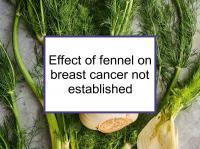Fennel (Foeniculum vulgare) belongs to the umbelliferae family, which also includes carrots, celery, dill, parsnips, parsley, cumin, and coriander. All parts of the fennel plant are edible (bulb, stalk, leaves and seeds). Fennel is a dietary source of vitamin C and fiber. Fennel also incorporates myricetin and various other phytochemicals.
These include D-limonene, rutin, quercetin, and kaempferol, all of which have demonstrated chemopreventive activities. Fennel seeds also contain some gallic acid and melatonin.
Fennel contains the terpenoid anethole, which has been reported to have both estrogenic and chemopreventive effects, as well as estragole, which acts as a rodent carcinogen in large doses. Fennel has been shown to have antioxidant, antifungal, antibacterial and antithrombotic properties.
Fennel seed tea and other fennel preparations have been used in some traditional medicine systems to sooth colic in babies, and to help expel gas and treat indigestion in adults. Other traditional uses include enhancing breast milk production, promoting menstrual flow, easing childbirth, and inducing abortion. Extracts of fennel have been shown to be induce melanoma and liver cancer cell death. A fennel seed diet was shown to prevent carcinogen-induced skin cancer in mice in another study.
Breast cancer-related effects of consuming fennel
Information concerning fennel consumption as it relates to risk of breast cancer is limited. Fennel extract has been shown to be cytotoxic to ER+/PR+ and triple negative human breast cancer cells. Fennel seed is a source of melatonin, which protects against breast cancer in several ways, including by reducing aromatase activity within the breast, thereby decreasing estrogen production. Fennel seed compound gallic acid has been shown to increase the effectiveness of paclitaxel chemotherapy in hormone receptor positive (ER+/PR+) breast cancer cells.
However, reports that fennel is being used to increase breast milk production are concerning because they suggest that fennel acts directly on breast tissue. Fennel has been shown to have estrogenic properties. Until more information becomes available, it appears inadvisable for breast cancer patients, survivors and those at high risk to consume more than modest amounts of fennel, fennel seed, or fennel seed tea. Fennel oil should be avoided.
Additional comments
Women who are pregnant or nursing should not consume fennel or fennel seed since fennel can stimulate the uterus.
Fennel has been shown to impair the absorption of the antibiotic ciprofloxacin (Cipro) and in all likelihood would interfere similarly with other fluoroquinolone antibiotics.
Sources of information in this webpage
The information above, which is updated continually as new research becomes available, has been developed based solely on the results of academic studies. Clicking on any of the underlined terms will take you to its tag or webpage, which contain more extensive information.
Note that while we are continually searching for new evidence specifically concerning this food, there is not much interest in fennel among breast cancer researchers, so few directly relevant studies are available.
